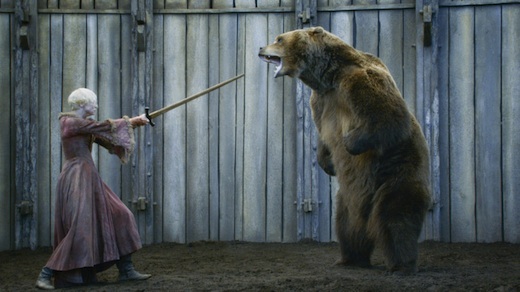There is something interesting about Pacific Rim. It has spawned a lot of very divergent reactions among critics. Take this merciless takedown by The Jeff and Casey Show for example:
And then compare it to this commentary by Mythbuster Adam Savage
While Jeff and Casey call it the worst Blockbuster Movie ever (even worse than Transformers), Adam seems to have enjoyed it a great deal. I’ve seen a similar divide between me and the friends I’ve seen the movie with. Most of my friends thought it was rather forgettable while I had a blast.
The thing that I find perplexing in here is that I actually completely emphasize with all of Jeff and Casey’s arguments. The premise of this movie is incredibly stupid and threadbare. It is full of baroque details that represent gross misunderstandings of physics and technology. I would be usually arguing in a similar vein, picking apart the lack of realism and common sense. For example, I had a longer discussion with my podcast friends on how the world of Game of Thrones fails to reflect the dramatic changes of seasons. How come time is still measured in years if a season cycle can last multiple years? How did the people of Westeros arrive at the concept of what a year is in the first place?

How come there are bears in Westeros? How do they even hibernate if winters are arbitrary in length and last for years?
A convenient way out of this dissonance for me would be to argue to consider consistency. Pacific Rim is a modern re-imagining of the old Godzilla movies. A hokey story barely holding together to set up the gratuitous monster fights is par for the course. On the other hand, Game of Thrones is a hyper-realistic take on the Fantasy genre and the result of meticulous research and word-crafting. So oversights like these appear more substantial because they are uncharacteristic.
But on closer inspection this way out doesn’t hold up to scrutiny. I would probably use the same kinds of arguments to take down Transformers. Arguably, Transformers doesn’t take itself any more seriously than Pacific Rim. Yet the same kind of stupidity that I think is sinful in Transformers, appears as endearing in Pacific Rim.
There is a certain way in which we formulate criticism that I noticed at some point when doing user testing. As long as a certain works connects and speaks to us in some way or form, we are able to accept it’s flaws, even embrace them – the way we may love a cute kitten even if it constantly shits on our carpet. But if a work fails to establish this connection or if the flaws accumulate beyond a certain threshold, we tend to flip our way of thinking. What was previously glossed over or even embraced then becomes an aggravating factor. Once the initial glow wears off and the kitten grows up to be a big and fat cat, that spoiled bastard better learns to stay off the goddamn carpet.

Yes, this is an analogy to Pacific Rim.
This may be an explanation. But I think the reactions to Pacific Rim show that the rabbit hole is even deeper. Some people tout Mako, the female protagonist as a new benchmark for writing strong female characters. Jeff and Casey offer solid arguments why it’s blatantly sexist. Those vast differences in opinion even when looking at details of the film aren’t that well explainable by an infatuation with the film’s overall themes. It’s not like Mako is a sexist character and that sexism is just glossed over by people because they really enjoy old Godzilla movies. Rather, there is an ambivalence present at a molecular level as well.
There is one aspect of Pacific Rim that for me still trumps Transformers or other Blockbuster movies similar to it. The entire movie conveys a message of inter-cultural cooperation on multiple levels. Not only are the giant robots manufactured in different countries. The actual act of piloting them requires two humans to cooperate. The two protagonists originate from America and Japan respectively and it is their mutual cooperation that makes victory possible. In one of the sideline plots, two arguing scientists also lay down their quarrels to conduct a risky experiment that reveals a vital clue on how to overcome the impending doom. There are probably even more details that echo this theme. To me, this is still a quantum leap ahead of the militaristic machismo veiled with thin humanistic platitudes in Transformers.
I will be monitoring the response to this particular movie. So if you have any interesting analysis or just your own opinions, feel free to drop a line.





